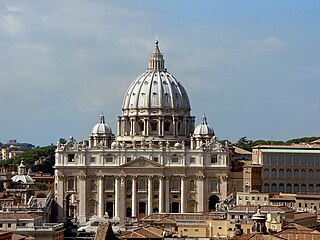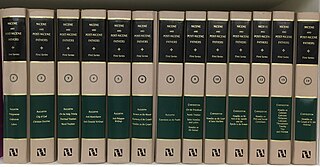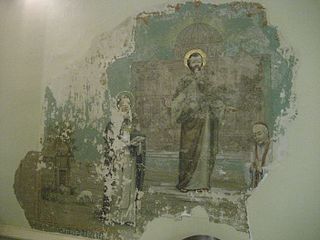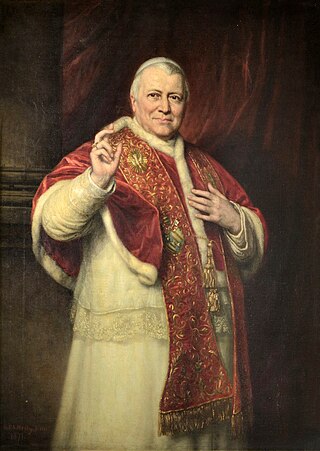Related Research Articles
Ecclesia may refer to:
Faith and rationality exist in varying degrees of conflict or compatibility. Rationality is based on reason or facts. Faith is belief in inspiration, revelation, or authority. The word faith sometimes refers to a belief that is held in spite of or against reason or empirical evidence, or it can refer to belief based upon a degree of evidential warrant.

The First Ecumenical Council of the Vatican, commonly known as the First Vatican Council or Vatican I, was the 20th ecumenical council of the Catholic Church, held three centuries after the preceding Council of Trent which was adjourned in 1563. The council was convoked by Pope Pius IX on 29 June 1868, under the rising threat of the Kingdom of Italy encroaching on the Papal States. It opened on 8 December 1869 and was adjourned on 20 September 1870 after the Italian Capture of Rome. Its best-known decision is its definition of papal infallibility.
Lumen gentium, the Dogmatic Constitution on the Church, is one of the principal documents of the Second Vatican Council. This dogmatic constitution was promulgated by Pope Paul VI on 21 November 1964, following approval by the assembled bishops by a vote of 2,151 to 5. As is customary with significant Roman Catholic Church documents, it is known by its incipit, "Lumen gentium", Latin for "Light of the Nations".

Dei verbum, the Second Vatican Council's Dogmatic Constitution on Divine Revelation, was promulgated by Pope Paul VI on 18 November 1965, following approval by the assembled bishops by a vote of 2,344 to 6. It is one of the principal documents of the Second Vatican Council.

The magisterium of the Catholic Church is the church's authority or office to give authentic interpretation of the word of God, "whether in its written form or in the form of Tradition". According to the 1992 Catechism of the Catholic Church, the task of interpretation is vested uniquely in the Pope and the bishops, though the concept has a complex history of development. Scripture and Tradition "make up a single sacred deposit of the Word of God, which is entrusted to the Church", and the magisterium is not independent of this, since "all that it proposes for belief as being divinely revealed is derived from this single deposit of faith".
The infallibility of the Church is the belief that the Holy Spirit preserves the Christian Church from errors that would contradict its essential doctrines. It is related to, but not the same as, indefectibility, that is, "she remains and will remain the Institution of Salvation, founded by Christ, until the end of the world." The doctrine of infallibility is premised on the authority Jesus granted to the apostles to "bind and loose" and in particular the promises to Peter in regard to papal infallibility.

Sacred tradition, also called holy tradition or apostolic tradition, is a theological term used in Christian theology. According to this theological position, sacred Tradition and Scripture form one deposit, so sacred Tradition is a foundation of the doctrinal and spiritual authority of Christianity and of the Bible. Thus, the Bible must be interpreted within the context of sacred Tradition and within the community of the denomination. The denominations that ascribe to this position are the Catholic, Eastern Orthodox, and Oriental Orthodox churches, and the Assyrian churches.
Ecclesia Dei is the document Pope John Paul II issued on 2 July 1988 in reaction to the Ecône consecrations, in which four priests of the Society of Saint Pius X were ordained as bishops despite an express prohibition by the Holy See. The consecrating bishop and the four priests consecrated were excommunicated. John Paul called for unity and established the Pontifical Commission Ecclesia Dei to foster a dialogue with those associated with the consecrations who hoped to maintain both loyalty to the papacy and their attachment to traditional liturgical forms.
Mystici Corporis Christi(The Mystical Body of Christ) is an encyclical issued by Pope Pius XII on 29 June 1943 during World War II. Its main topic is the Catholic Church as the Mystical Body of Christ.

Bibliology, also known as the Doctrine of Scripture, is a branch of systematic theology that deals with the nature, character, and authority of the Bible.
The Paschal mystery is one of the central concepts of Catholic theology relating to the history of salvation. According to the Compendium of the Catechism of the Catholic Church, "The Paschal Mystery of Jesus, which comprises his passion, death, resurrection, and glorification, stands at the center of the Christian faith because God's saving plan was accomplished once for all by the redemptive death of himself as Jesus Christ." The Catechism states that in the liturgy of the Church "it is principally his own Paschal mystery that Christ signifies and makes present."
Subsistit in is a Latin phrase which appears in Lumen gentium, the document on the church from the Second Vatican Council of the Catholic Church. Since the council, the reason for use of the term "subsists in" rather than simply "is" has been disputed. Generally, those who see little or no change in church teaching in Vatican II insist on the equivalence of subsistit in and "is". Those who point to a new, ecumenical thrust in Vatican II insist that the term was introduced as a compromise after much discussion, and acknowledges new elements in the council's teaching.
Branch theory is an ecclesiological proposition that the One, Holy, Catholic, and Apostolic Church includes various different Christian denominations whether in formal communion or not. The theory is often incorporated in the Protestant notion of an invisible Christian Church structure binding them together.

Pastor aeternus was issued by the First Vatican Council, July 18, 1870. The document defines four doctrines of the Catholic faith: the apostolic primacy conferred on Peter, the perpetuity of the Petrine Primacy in the Roman pontiffs, the definition of the papal primacy as a papal supremacy, and Papal infallibility – infallible teaching authority (magisterium) of the Pope.

A dogma of the Catholic Church is defined as "a truth revealed by God, which the magisterium of the Church declared as binding". The Catechism of the Catholic Church states:
The Church's Magisterium asserts that it exercises the authority it holds from Christ to the fullest extent when it defines dogmas, that is, when it proposes, in a form obliging Catholics to an irrevocable adherence of faith, truths contained in divine Revelation or also when it proposes, in a definitive way, truths having a necessary connection with these.
The theological notes designate a classification of certainty of beliefs in Catholic theology.

Papal infallibility is a dogma of the Catholic Church which states that, in virtue of the promise of Jesus to Peter, the Pope when he speaks ex cathedra is preserved from the possibility of error on doctrine "initially given to the apostolic Church and handed down in Scripture and tradition". It does not mean that the pope cannot sin or otherwise err in some capacity, though he is prevented by the assistance of the Holy Spirit from issuing heretical teaching even in his non-infallible Magisterium, as a corollary of indefectibility. This doctrine, defined dogmatically at the First Vatican Council of 1869–1870 in the document Pastor aeternus, is claimed to have existed in medieval theology and to have been the majority opinion at the time of the Counter-Reformation.
The term Roman Catholic is used to differentiate the Catholic Church and its members in full communion with the pope in Rome from other Christians who identify as "Catholic". It is also sometimes used to differentiate adherents to the Latin Church and its use of the Roman Rite from Catholics of the Eastern Catholic Churches. It is not the official name preferred by the Holy See or bishops in full communion with the pope as a designation for their faith or institution.
The Catholic theology of Scripture has developed much since the Second Vatican Council of Catholic Bishops. This article explains the theology of scripture that has come to dominate in the Catholic Church today. It focuses on the Church's response to various areas of study into the original meaning of texts.
References
- ↑ Roberto De Mattei, John Laughland, Pius IX, p. 137
- ↑ "First Vatican Council | Description, Doctrine, & Legacy". Encyclopedia Britannica. Retrieved 2020-02-19.
- ↑ Pope Pius IX, Dei Filius, Chapter II
- ↑ Vidani, Peter. "Vatican I and God's natural knowability". Philosophy at AMU. Retrieved 2020-02-19.
- ↑ Egan, Philip A., Philosophy and Catholic Theology: A Primer, Liturgical Press, 2017, no pagination ISBN 9780814683538
- ↑ Dei Filius, 1870, Chapter IV
- ↑ Avery Dulles (1987), The Catholicity of the Church, Oxford University Press, p. 131, ISBN 0-19-826695-2
- ↑ Richard Faber. Katholizismus in Geschichte und Gegenwart. 2005, p. 42
- ↑ Theodorus Granderath. Constitutiones Dogmaticae Sancrosancti Oecumenici Concilii Vaticani. (Herder 1892), p. 5 indicates that the vote was overwhelming. Granderath's book was called "one of the most important contributions to the literature of dogmatic theology in our day" in a review in the American Ecclesiastical Review.
- ↑ Granderath, p. 27
- 1 2 Jean-Yves Lacoste, Encyclopedia of Christian Theology: G - O (CRC Press, 2005 ISBN 1-57958-250-8, ISBN 978-1-57958-250-0), p. 1666
- ↑ Granderath, pp. 29-32
- ↑ Lacoste, Jean-Yves (2004). "Vatican I, Council of". Encyclopedia of Christian Theology. New York: Routledge. p. 1666. ISBN 1-57958-250-8.